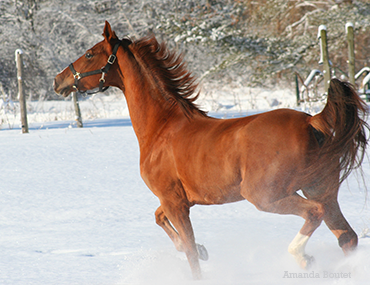Just as the summer months bring fly spray, bathing, sunscreen, and heat protection, the winter months bring their own special care requirements for our horses. Fortunately, preparing for winter can be an easy task as long as you plan ahead.
Blanketing
Most people assume that horses need to be blanketed in the winter. In fact, horses are extremely good at regulating their body temperature. That long winter coat that you have been grooming to perfection is, in fact, a fantastic insulator. However, please note though that a horse that has been clipped, old, sick, thin or not provided shelter away from the elements should be provided the extra warmth and protection of a winter weatherproof blanket. Always make sure blankets are fitted properly to avoid your horse getting blanket rubs or tangles.
Water
Just like in the summer months fresh water should always be available to your horse, and it's important to remember that SNOW DOES NOT COUNT as a water source. Horses are also more likely to drink warm water over ice cold water so having a water heater is something to look into before the winter months arrive. Otherwise, be prepared to break ice in frozen water buckets in stalls and out in the pasture.

Feed
Your horse's digestive system is very important when it comes to keeping him warm in the winter months. During digestion, microbial fermentation happens, which produces heat. What fuels this process, you ask? Hay! Hay has a very high fiber content which causes it to be digested slower then grain. This longer process of digestion results in keeping your horse's internal heater warm for a much longer period of time. An increase in grain in the winter months can be beneficial as well. High fat grains, beet pulp, oils and corn will help increase the fat calorie intake of your horse, therefore adding weight and body fat.
Grooming
Your horse's winter hair is very important when it comes to staying warm. This means you are responsible for keeping that fuzzy horse of yours clean from debris, sweat and dead hair. Your grooming routine from summer months should stay the same, but make sure to pay extra attention to any scratches, lumps or bumps that could be hidden in your horse's long hair. If your horse is wearing a blanket make sure you remove it regularly to check your horse's coat condition.
Shoeing
During the winter months it is important to discuss with your farrier the best option for your horse when it comes to horse shoes. Whether your horse goes barefoot, has shoes with borium, shoes just on front, or all around always make sure the surface you are working on are free from ice.
If you have any questions or concerns, you should always visit or call your veterinarian – they are your best resource to ensure the health and well-being of your pets.
